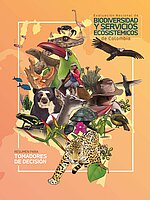Trust fund - Bridging science, policy and practice for biodiversity and ecosystems: BES-Net
Robust and reliable evidence on the state of biodiversity and trends of ecosystem services is the cornerstone of informed policymaking and planning. The Intergovernmental Science-Policy Platform on Biodiversity and Ecosystem Services (IPBES) provides a global mechanism to critically evaluate and synthesize the state of knowledge on biodiversity and its benefits to people’s lives, producing assessments on a range of themes. The Biodiversity and Ecosystem Services Network (BES-Net) promotes dialogue among scientists, policymakers and practitioners around the IPBES assessment themes and inspires joint action for more effective biodiversity and ecosystem services management. BES-Net strengthens the capacity of institutions in developing countries to apply latest IPBES tools and undertake ecosystem assessments at the national level. The project also provides organizations and individuals around the world with a platform to communicate and collaborate.
- Countries
- Bosnia and Herzegovina, Cameroon, Colombia, Dominican Republic, Ethiopia, Kazakhstan, Kenya, Viet Nam
- IKI funding
- 4,500,000.00 €
- Duration
- 01/2016 till 06/2022
- Status
- completed
- Implementing organisation
- United Nations Development Programme (UNDP)
- Political Partner
-
- Alexander von Humboldt Institute on Research for Biological Resources - Colombia
- Ethiopia Biodiversity Institute (EBI)
- Federal Ministry of Environment and Tourism - Bosnia and Herzegovina
- Institute of Strategy and Policy on Natural Resources and Environment (ISPONRE) - Viet Nam
- Ministry of Ecology, Geology and Nature Protection – Kazakhstan*
- Ministry of Environment, Nature Protection and Sustainable Development (MINEPDED) - Cameroon
- Ministry of Environment and Forestry - Kenya
- Ministry of Environment and Natural Resources - Dominican Republic
- Online
State of implementation/results
- Project completed.
- To contribute to the Intergovernmental Science-Policy Platform on Biodiversity and Ecosystem Services (IPBES) Capacity Building Rolling Plan, BES-Net has been applying the Trialogue methodology to facilitate dialogues among policymakers, scientists and practitioners around the IPBES assessment themes such as pollinators and land degradation. The methodology was successfully implemented in Eastern Europe (2017), the Caribbean (2018), Anglophone Africa (2019) and Central Asia (2019), supporting the development of the IPBES assessment uptake in 24 countries. Progress by Trialogue participants and their partners in implementing priority actions was captured on the IPBES Impact Tracking Database (ipbes.net/…) and highlighted in the BES-Net newsroom (www.besnet.world/…). A digital story was also published, presenting the key outcomes achieved to date with the participants’ testimonies (bes-net.shorthandstories.com/…)
- Four countries, i.e. Cameroon, Colombia, Ethiopia and Viet Nam, finalised the national ecosystem assessments (NEA) with global support of the UN Environment Programme World Conservation Monitoring Centre (UNEP-WCMC). A series of SGAN webinars and other dissemination actions were conducted to present the key findings of the respective assessments (www.ecosystemassessments.net/…).
- The BES-Net team regularly interacted with 126 institutional partners. The consortium members participated in key IPBES Task Forces (e.g. Capacity building; knowledge and data) to ensure that the project’s experiences and lessons are adequately shared with other partners collaborating with IPBES and contributing to the platform’s work programme.
- Since its launch in December 2016, the BES-Net web portal has served as a one-stop-shop for the global BES information about the latest job vacancies, events and news articles, and with an online library that hosts over 4,100 knowledge resources. BES-Net issues bi-monthly newsletters available on www.besnet.world/…
- Building on the project achievements to date, the Second Phase of BES-Net was initiated in Jan 2020 with the financial support of IKI and SwedBio. BES-Net II (2020-28) aims to formalize the scientists-policymakers-practitioners partnership and strengthen synergy and complementarity in their BES-related decisions, actions and subsequent impacts in target countries. It will also upscale the successful approaches of BES-Net I, promoting NEAs in four new countries and continuously enhancing the uptake of IPBES assessments in some 40 countries through the Trialogue approach.
Latest Update:
04/2024
Further links
Project relations
Legend:
The link has been copied to the clipboard







